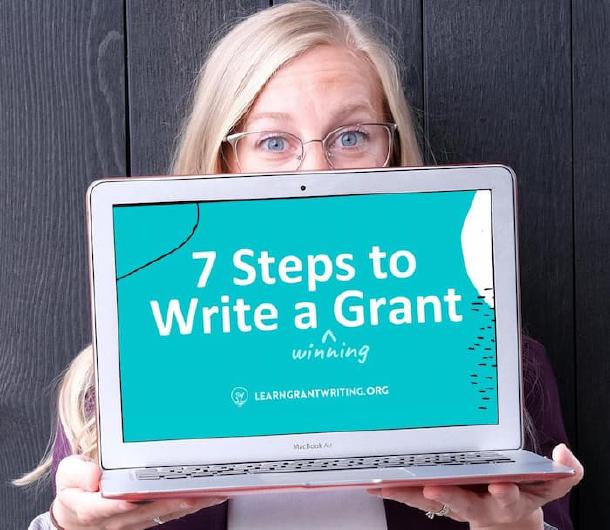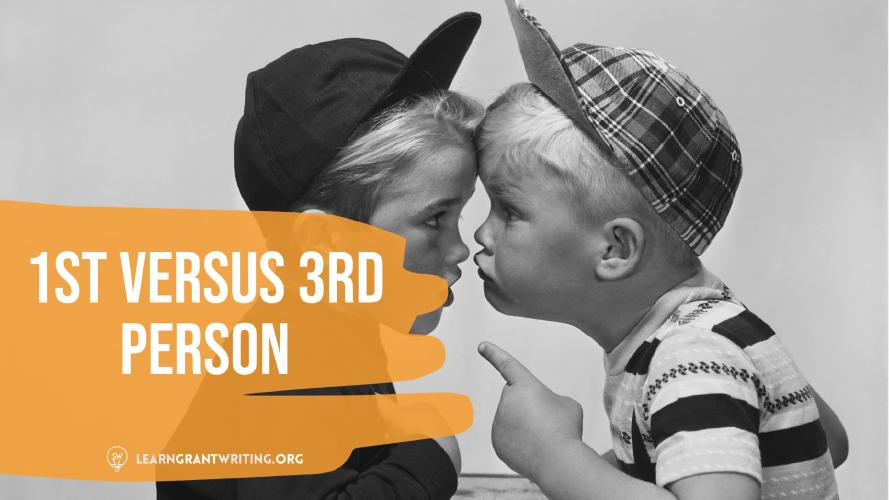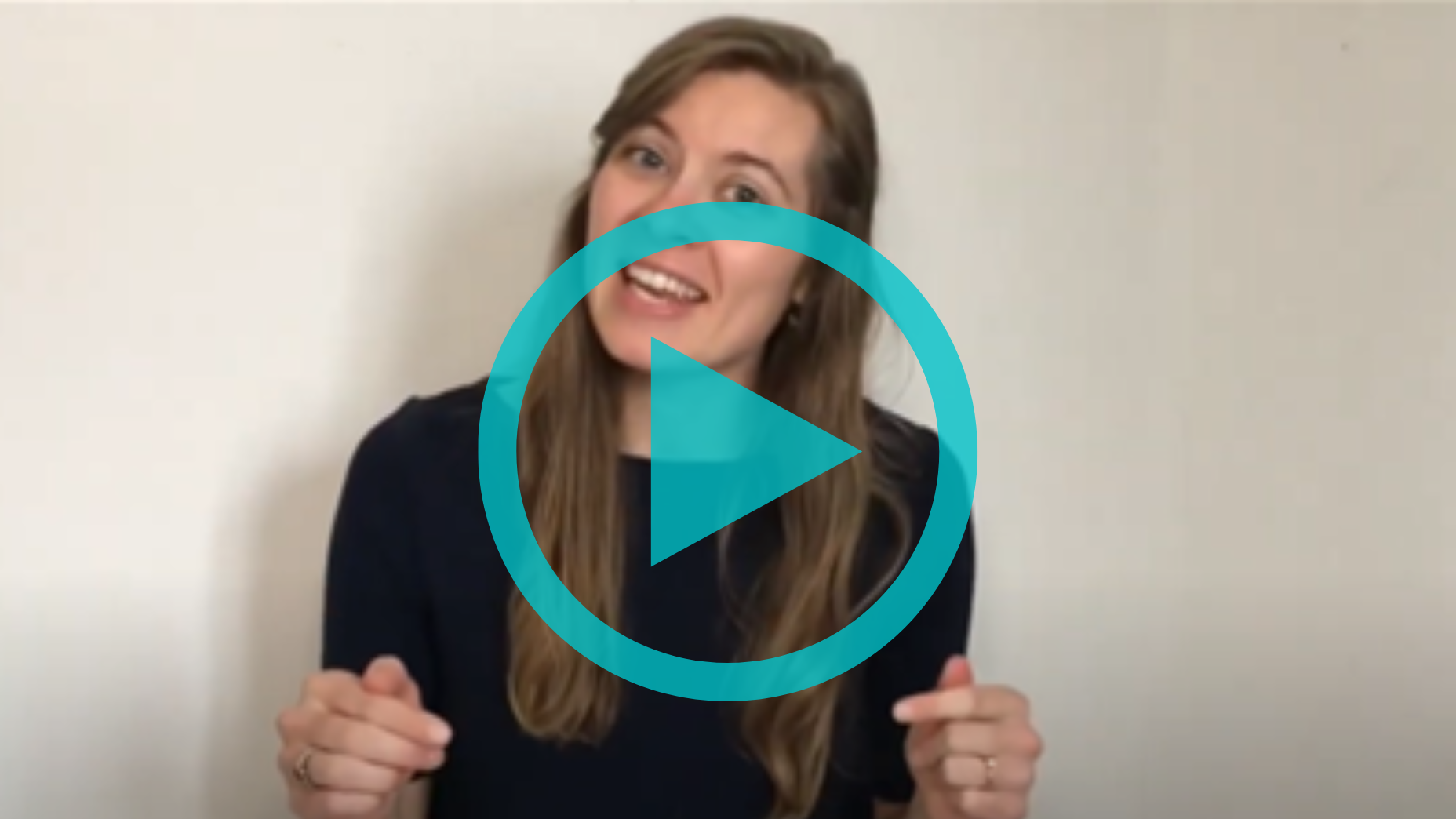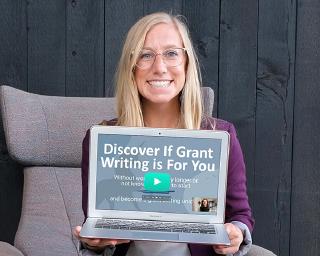The ultimate writing dilemma?
As a grant writer, should I write grants in the first or third person? Ah, a question as old as...grant writing. We get it. It’s a good question. We have asked that very question ourselves because our high school English teachers and college professors hammered in that using the first person was not appropriate for research papers, but does grant writing need to abide by that same rule? Also, wowza, it just doesn’t feel right to only use the third person in grant proposals. Can you relate?
The short answer to that question, “Should I write grants in the first or third person?”, is that both the first and the third person are fine! You should use a blend of the first person and the third person when writing proposals. In this blog post, we’ll break down what is the difference between the first person and the third person, what style of writing grant writing really is, our reasoning for using a blend, an example of blending in action, the importance of writing with the end goal in mind, and a few extra tips for successful writing. In other words, continue reading for the long(er) answer. 👇
Discover Grant Writing as a Career
If you’re interested in becoming a grant writing consultant, check out this free training on how you can pull off a meaningful career change.
Access Free Class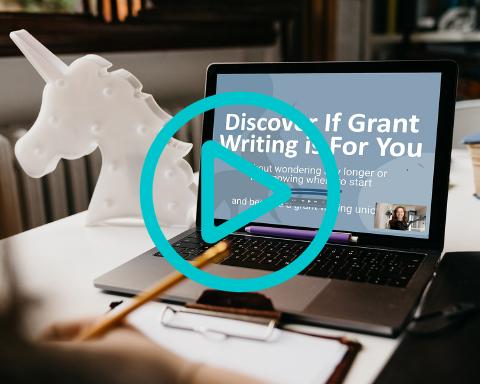
What is the difference?
First, what is the difference between the first person and the third person? According to Owl at Purdue, the first person or first person point-of-view refers to using the first-person pronouns like I or We. Conversely, the third person or third person point-of-view refers to the use of third-person pronouns like he, she, they, and it.
Generally, the use of first person point-of-view is usually avoided in academic writing (the reason why good ol’ Ms. Brooks was liberal with that red pen on our research papers!). Typically, the third person point-of-view has a wide range of uses in both creative and academic contexts. This wide range of appropriate usage makes it a bit more challenging to determine when and where to use the third person.
More of a YouTube person? Watch the video on this topic here.
What is grant writing?
Even more challenging is that grant writing is its own particular style of writing. Grant writing is a combination of creative storytelling and more technical or academic style writing. According to the Association of Fundraising Professionals, a grant is, “a financial donation given to support a person, organization, project, or program.” We know that a grant is only successful if we meet the requirements in the funding guidelines (and some!) and if we can tell our organization’s story in a compelling way while including appropriate technical information.
Basically, how we tell our story or write our proposal is just as important as what our story is and what information our proposal includes. In that regard, grant writing requires stylistic finesse. Thus, the question of writing in the first person or the third person matters. It matters a great deal. The fact that you are curious about it says a lot about you as a grant writer. It says that you care about your work and your organization. We love working with people who care. :)
People also ask us if grant writing is hard. Doubtless, grant writing is a unique skill complete with its own challenges, but that’s why Learn Grant Writing exists. We are here to give you grant writing help, transform you into a grant writing unicorn, and teach you how to win grants to make tangible, positive change in your community.
Why use both first person and third person in grant writing?
In short, we teach people to use both the first and the third person because we really are no different than you: we want to have our cake and eat it too. We want the best of both worlds.
Breaking it down, you could use the third person or “Churches United for the Homeless” throughout the entirety of your narrative. This would come across as specific and formal. It would also offer repeated subliminal advertising of the organization during the review process. Subliminal advertising is using images and sounds to influence consumers' responses without their being conscious of it. It’s a little sneaky, but it works. At the same time, using “Churches United for the Homeless” often takes up more space in your already significantly limited word count requirement. It can sometimes also appear impersonal or aloof.

On the other hand, the first person point of view has the benefits of sounding more personal, relatable, and collaborative. To some funders, it may also come across as being a bit too vague. Applicants lose the advantage of reminding reviewers who the organization is because other proposals will also be using the universal “we” source. For example, if your proposal is 30 pages long and you only used the first person, there’s no doubt that by page 29 the reviewer will have forgotten who the applicant organization is. You’re just another “we” and “our organization” trying to do good work in the world.
In our decades of experience, we have found that it is antiquated to write strictly in the third person and that it is too informal to write strictly in the first person. Used on their own, neither form achieves what we want. Thus, we prefer to use a blend to reap the advantages of both forms. Using a blend makes the proposal more readable and personable for our narrative reviewers. Moreover, a mix of both creates a natural sentence structure variety which is key to producing good writing.
Our biggest hard and fast rule is to never say “I” but use “we” and “our” to refer to your organization.
Grant writing made easy: blending in action
We’ll go through an example with you. Take a look at the excerpt below from a grant application below:
“Much of our focus has been devoted to tackling recidivism. We now need support to kick-start the Department’s objectives regarding recovery services.”
That above excerpt is written in the first person and the third person. It reads nicely, huh? No hiccups. No issues.
Comparatively, in the blurb below we changed everything to the third person:
“The Department’s resources have been focused on tackling recidivism. The organization needs support to kick-start the Department’s objectives regarding recovery services.”
That excerpt does not read as smoothly as the original version. There are only so many different ways to rephrase “the Department ”. Furthermore, at only two words, “the Department”, is a relatively short name for an organization. But think of other names: Churches United for the Homeless (five words!), Ronald McDonald House Charities of the Red River Valley (nine words!), Missions in Motion International Ministries (five words!). What a mouthful it would be to use the third person with an organization name as long as those.
There is no good reason for us to repeat that name multiple times in one sentence or even in one paragraph. Trying to do so makes the excerpt extra clunky when it doesn’t need to be. To be abundantly clear, clunky is not a characteristic of high quality, readable, and compelling writing.
Sure, there are instances you can abbreviate like RMHC for Ronald McDonald House Charities, but we don’t encourage many abbreviations. Grant reviewers don’t know or won’t remember all of your organization’s unique acronyms or abbreviations. You’re ingrained into your organization’s work and at staff meetings everyone knows what you’re talking about when you speak in acronyms. However, the grant reviewer is not at those same staff meetings and they do not understand what you’re talking about when you use an excessive amount of acronyms. You need to keep it simple and crystal clear for your grant reviewers. In other words, you need to limit the amount of acronyms and abbreviations you include in your proposal.
Our end goal: why grant writing is important
Our goal is to create a positive experience for our narrative reviewers. We want to combine our story with persuasive statistics and only include the most helpful and purposed words. We want our narrative to read like an informative, compelling, well-written book. We do all of that in order to win the grant funding we are requesting so that we can incite positive change in our community—the whole reason why grant writing is so important! Solely writing in the first person or the third person does not bring us closer to reaching that goal.
For more on how we teach about using the first and third person in grant writing, check out Module 3 in our program called the Global Grant Writers Collective. At about the 10-minute mark, we offer a deep dive into the question. Meredith reads aloud a few examples so that you can physically hear the difference between a perfectly blended first and third person sentence and clunky sentence.
Write with the end goal in mind. Think carefully about your grant reviewers and what their perspective is when reading your proposal. Think about them especially when you’re in the editing stages of the grant writing process.
Trust yourself
At the end of the day, writing is a bit about feeling or, at the very least, the flow of your written word. Sometimes it is okay to ask yourself, “what feels most right in this sentence to you?” First or third person? As long as your grammar, punctuation, and spelling are on point, you needn’t worry too much about royally messing up the rest of the sentence. Chances are that you are golden. So, if it seems like the first person might work and flow better than the third person, go with that.
A favorite trick we constantly use and recommend is to read the sentence or paragraph in question out loud. Listen, we promise that all the best writers do it. You can trust that you are in good company when you sit at your desk or walk around the block with paper in hand reading your work out loud to yourself—we do it too. (You better believe that at least one person on our team read this very paragraph aloud.)

Something different happens when you physically hear the words rather than simply see them again for the millionth time. When you hear your words you can catch mistakes, bad words, needless words, clarify the flow of your proposal, and figure out if you should use the first person or the third person. We encourage you to read your work aloud, edit as necessary (with the end goal in mind), then read it aloud a final time. It sounds better after your edits, huh?
Additionally, as grant writers, we need to trust our gut. Rarely does our gut steer us in the wrong direction. Plus, remember that we are powerful grant writing unicorns and with great power comes great responsibility. Part of the responsibility of being a unicorn is taking ourselves seriously (but not too seriously), trusting our intuition, and making moves with confidence! Make this small move of deciding the first person or the third person with confidence.
As a final fail safe, ask your editor. Per best practice, here at Learn Grant Writing, we always recommend having an outside individual complete a final read-through of your grant application prior to submission. If you’re concerned, ask that individual to specifically review your use of first and/or third person.
Final Takeaway
In summary, as grant writers we need to use both the first person and third person in our narratives. Write grants in a blend of the first and the third person for readability and sentence structure variety. The ultimate goal is preparing a clear, easy to read narrative that will effectively compel grant reviewers to fund our request. We need both first and third person to make our goal a reality.
Grant Writing Resources
Keep reading our blog articles. Specifically, this one has more tips for writing draft narratives. This post highlights the top mistakes grant writers make and how to avoid them.
Also, check out our FREE Class on Writing Grants in just 7 easy steps!
Shoot us a DM on Instagram! 🦄
Free Grant Writing Class
Learn the 7-steps to write a winning grant application and amplify the impact you have on your community.
Access Free Class